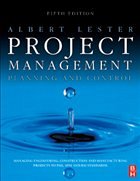Main description:
Fully aligned with the latest 2006 Project Management Body of Knowledge (PMBOK) for both the Project Management Institute (PMI) and the Association of Project Management (APM), this book is a vital study aid for any Project Management Professional (PMP) qualification and reference that practising project managers will want to keep to hand.
Each of the core project management topics and principles is explained and applied through a careful balance of theory and practical examples. With its real-life case studies of engineering, manufacturing and construction projects, clear summaries and self-test resources, the book is a complete guide for any project manager.
The author: Albert Lester was a project manager with Tarmac Construction and Foster Wheeler Power Products, managing large multi-discipline projects. He has been a compiler and examiner for the APMP certificate, lectures on project management and has assessed many project management courses for APM.
- Covers the complete body of knowledge for project management professionals in the engineering, manufacturing & construction sectors
- Covers all theory & practice for the newly revised PMI and APM qualification exams and the latest version of BS 6079-1:2002
- Online Q&A resources for self-testing written by a qualified PMP exam accreditor
Review quote:
Reviews of previous editions:
"It is an extremely well written and illustrated book that is easy to read. It will be bought and used by a wide range of engineers from students to the qualified, and by a wide range of professions." - ENGINEERING WORLD
"An excellent book... written with wit and clarity, it should be read eagerly by the managing director as well as the engineering trainee." - THE ENGINEER
Table of contents:
Project definition; Project management; Program management; Project environment; Business case; Investment appraisal, DCF, NPV; Stakeholder analysis; Project success criteria; Organization structures; Organizational roles; Project life cycle; Work content & scope (WBS); Planning blocks & subdivision of blocks; Estimating; Project management plan; Risk management; Quality management; Change management; Configuration management; Time management, Basic network principles; Analysis types; Precedence diagrams; Lester diagram; Float; Milestones & line of balance; Simple examples; Progress reporting; Project management and planning; Network applications outside the construction industry; Resource management, Histograms, S Curves; Cash flow and cash flow curves; Budgeting, cost control & earned value analysis; Control graphs and reports; Procurement; Value management & value engineering; Health & safety & environment; Information management; Communication; Teamwork; Leadership; Negotiation; Conflict management & dispute resolution; Project close-out and hand over; Project close-out report and review; Worked example 1: Small bungalow; Worked example 2: Pumping installation; Worked example 3: Motor car; Worked example 4: Battle tank; Hornet Windmill program; Stages and sequences; Abbreviations & acronyms; Glossary; APMP learning objectives; Typical question areas; Summary of essential features; Bibliography; Index
Fully aligned with the latest 2006 Project Management Body of Knowledge (PMBOK) for both the Project Management Institute (PMI) and the Association of Project Management (APM), this book is a vital study aid for any Project Management Professional (PMP) qualification and reference that practising project managers will want to keep to hand.
Each of the core project management topics and principles is explained and applied through a careful balance of theory and practical examples. With its real-life case studies of engineering, manufacturing and construction projects, clear summaries and self-test resources, the book is a complete guide for any project manager.
The author: Albert Lester was a project manager with Tarmac Construction and Foster Wheeler Power Products, managing large multi-discipline projects. He has been a compiler and examiner for the APMP certificate, lectures on project management and has assessed many project management courses for APM.
- Covers the complete body of knowledge for project management professionals in the engineering, manufacturing & construction sectors
- Covers all theory & practice for the newly revised PMI and APM qualification exams and the latest version of BS 6079-1:2002
- Online Q&A resources for self-testing written by a qualified PMP exam accreditor
Review quote:
Reviews of previous editions:
"It is an extremely well written and illustrated book that is easy to read. It will be bought and used by a wide range of engineers from students to the qualified, and by a wide range of professions." - ENGINEERING WORLD
"An excellent book... written with wit and clarity, it should be read eagerly by the managing director as well as the engineering trainee." - THE ENGINEER
Table of contents:
Project definition; Project management; Program management; Project environment; Business case; Investment appraisal, DCF, NPV; Stakeholder analysis; Project success criteria; Organization structures; Organizational roles; Project life cycle; Work content & scope (WBS); Planning blocks & subdivision of blocks; Estimating; Project management plan; Risk management; Quality management; Change management; Configuration management; Time management, Basic network principles; Analysis types; Precedence diagrams; Lester diagram; Float; Milestones & line of balance; Simple examples; Progress reporting; Project management and planning; Network applications outside the construction industry; Resource management, Histograms, S Curves; Cash flow and cash flow curves; Budgeting, cost control & earned value analysis; Control graphs and reports; Procurement; Value management & value engineering; Health & safety & environment; Information management; Communication; Teamwork; Leadership; Negotiation; Conflict management & dispute resolution; Project close-out and hand over; Project close-out report and review; Worked example 1: Small bungalow; Worked example 2: Pumping installation; Worked example 3: Motor car; Worked example 4: Battle tank; Hornet Windmill program; Stages and sequences; Abbreviations & acronyms; Glossary; APMP learning objectives; Typical question areas; Summary of essential features; Bibliography; Index

